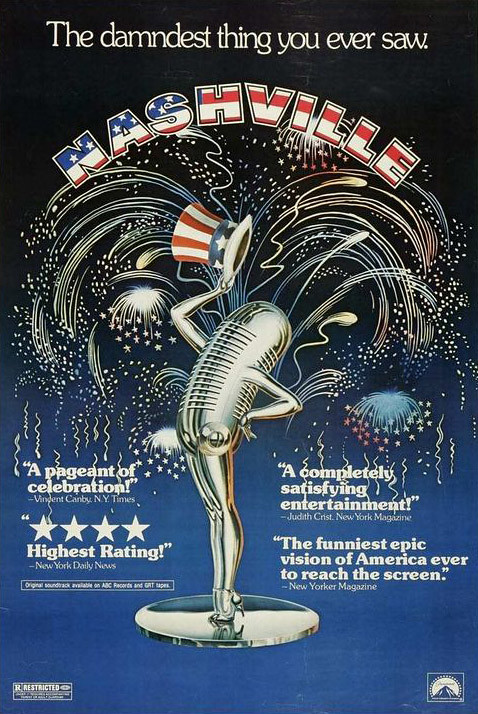
An impromptu online back-and-forth between a couple of friends about our favorite Robert Altman films (The Long Goodbye and McCabe and Mrs. Miller top my list, but it's a big list) led me to realize I'd never seen Nashville in its entirety. I've seen so many Altman films that I knew just what to expect, of course -- and it's hard not to now see echoes of this throughout a lot of his later films, most especially A Prairie Home Companion, which almost feels like the wiser, calmer, existential counterpart of Nashville.
It's interesting to know that Robert Altman works from other people's scripts; I can't help but wonder how it looked on the page, and how it'd have come out in someone else's hands. (Inferior to this, I'm sure, but still.) It's not just the overlapping dialogue and long takes of deceptively loose camerawork, it's the way scenes unfold as though there's no real point to them. The way he crowds everyone into a single scene and then lets them sort of meander about, blather at each other, or just generally fail to make their points clear. Sometimes that's the point of the character (like Geraldine Chaplin's cringe-inducing BBC reporter) but often it's just sort of the Altman way, a not-too-exaggerated reflection of how people talk when cameras aren't rolling. Scenes just roll around, get to a point eventually or sometimes don't, and then we cut to the next one. I'm not saying that scenes lack a distinct (and layered) reason for being, but the specifics of the scene are often a lot less specific than we're used to seeing in cinema.
The film itself is the intersection of fame and commerce and art (and politics and ego and dread), and nobody and nothing gets off unscathed by the proceedings. Just about everyone in town has the humble dream of making it as a country-music star. In fact so many people have that dream that it becomes oppressive, the endless sea of starry-eyed hope and attention-starved ambition. There are the exploiters and the exploited, the guileless and the savvy, the winners and the losers, and they all revolve in this uneasy orbit together, occasionally colliding -- or, to belabor a weak metaphor, at least altering each other's trajectories with their magnetic pulls. A couple of "real life movie stars" (Julie Christie and Elliott Gould) appear as themselves, and they have no idea who these country stars everyone worships even are; likewise these country stars are only marginally aware of the movie stars. Nashville, we are told, is its own little cosmos. (How's that for driving that metaphor all the way home?)
Additionally, I saw in the credits that all the country-western songs throughout were written by the performers who sang them (except Henry Gibson, whose songs were expected to be universally loved, and so he had some help from the composer). Keith Carradine's in particular struck me as surprisingly solid, and the end of the film wouldn't have worked without the stilted, uncomfortable performance of "It Don't Worry Me" eventually finding its footing and spreading out into a frightened crowd, proving to the world that "this is Nashville, not Dallas." Country music isn't my thing, but the songs here were clearly what made the movie (and, to be more cynical, what made the movie two hours and forty minutes long), and they are charismatic and down-homey and honest feeling, and they don't feel whipped together just to get the job done. Credit to the performers who wrote them, because like I said, I just don't think all of the intricate and clever plotting and complex characterizations would have held together without them.
Now can someone explain to me Jeff Goldblum's character?

No comments:
Post a Comment